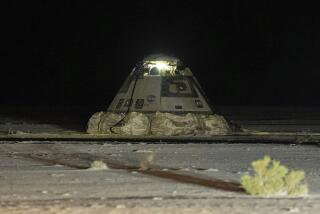Boeing says its astronaut capsule system suffered ‘anomaly’ during engine test
A portion of Boeing Co.’s astronaut test capsule suffered what was described as an “anomaly” during an engine test fire last month, which analysts said is likely to delay the Chicago aerospace giant’s first flight of astronauts from U.S. soil even further.
The issue occurred early last month when the test version of what’s known as the integrated service module was undergoing a hot-fire test of its launch-abort engines. The service module provides propulsion when the capsule reaches orbit. If something goes wrong during launch, the module will be able to blast the capsule away. It is located below the crew capsule, which holds astronauts and cargo.
Boeing said in a statement Monday that the engines on the service module successfully ignited and ran for the full duration of the test, which was performed at the White Sands Test Facility in New Mexico. But during engine shutdown, “an anomaly occurred” that resulted in a propellant leak. Boeing declined to provide more information about the problem or how the leak occurred. The crew module was not involved in this particular test.
The company said it was “confident” it had found the cause, is “moving forward with corrective action” and has been conducting a “thorough” investigation with NASA’s assistance.
Boeing and Hawthorne-based SpaceX are each developing crew capsules under NASA contracts that will transport astronauts to the International Space Station. Since the end of the space shuttle program in 2011, the U.S. has relied on Russia to take its astronauts to space.
Both companies are set to launch their capsules for the first time next month in an uncrewed test, with crewed tests set for the end of the year, according to NASA’s schedule. However, industry observers have believed the NASA timelines listed on their website were unrealistic, even before the anomaly.
“My sense is that it all gets pushed back at least two to three months at minimum,” said Marco Caceres, senior space analyst at Teal Group. “They may still meet the uncrewed flight test this year, but then the crewed one will be pushed back to next year.”
Boeing said in the statement that it did not have any schedule updates at the time. NASA did not immediately respond to a request for comment.
A report this month from the U.S. Government Accountability Office warned that certification of each company’s capsule could be delayed, possibly resulting in a gap in U.S. access to space as the contract with Russia extends only through November 2019.
Twitter: @smasunaga
More to Read
Inside the business of entertainment
The Wide Shot brings you news, analysis and insights on everything from streaming wars to production — and what it all means for the future.
You may occasionally receive promotional content from the Los Angeles Times.










